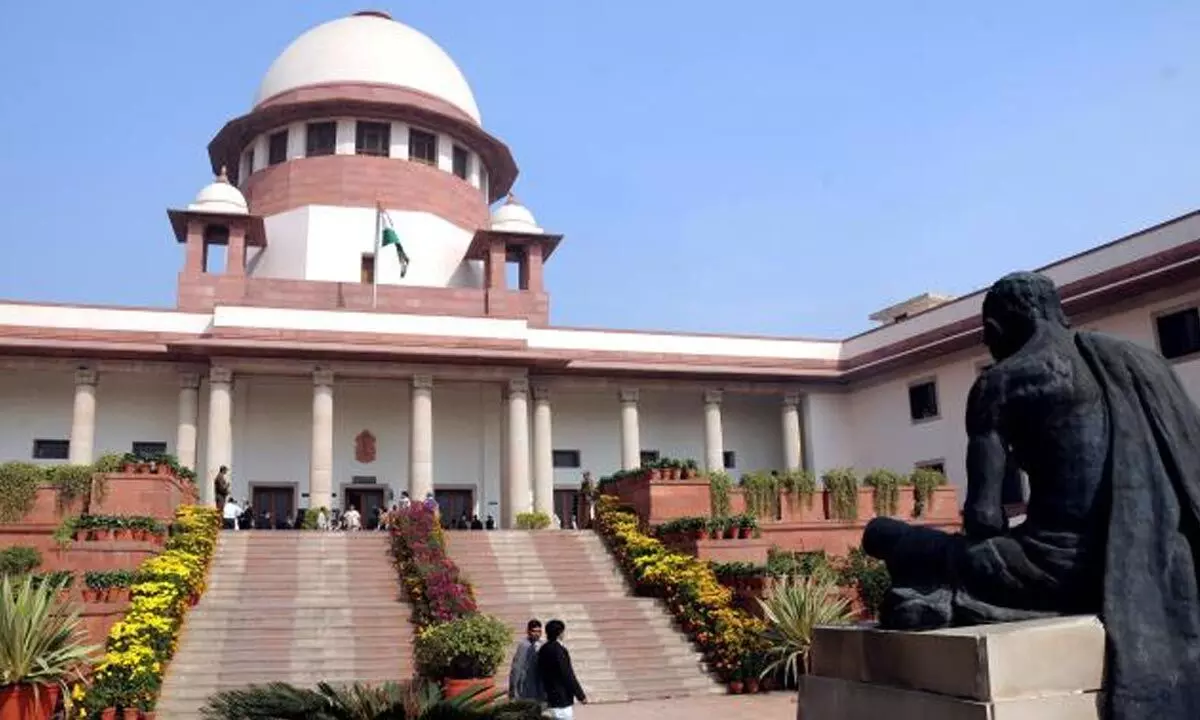Live
- PM Modi to Launch Major Development Projects in Visakhapatnam Today
- Clock towers of yore witnessed changing times of Hyderabad
- GDP may grow at its slowest since pandemic
- 95 killed as deadly quake rocks Tibet
- ACB mulls plan to quiz KTR
- Beach Festival scheduled for January 11-12
- Dushyant says people eager to end 'corrupt' rule
- APSSDC signs MoUs with Suzlon, Swaniti for green skill development
- Koil Alwar Tirumanjanam performed ahead of Vaikunta Ekadasi
- Ahead of polls, AAP's freebie spree to save Kejriwal
Just In
More than half-a-dozen pleas in Supreme Court challenging the Places of Worship Act 1991


Supreme Court of India
A plea has been filed in the Supreme Court challenging the constitutional validity of certain sections of the Places of Worship (Special Provisions) Act 1991, which makes a total of eight petitions filed so far against the Act.
New Delhi: A plea has been filed in the Supreme Court challenging the constitutional validity of certain sections of the Places of Worship (Special Provisions) Act 1991, which makes a total of eight petitions filed so far against the Act.
The recent petition filed by a retired army officer Anil Kabotra said a retrospective cut-off date -- August 15, 1947 -- was fixed to legalise the illegal acts of barbaric invaders and pointed out that the Act violates the principles of secularism. The plea, filed through advocate Ashwini Kumar Dubey, challenged the constitutional validity of Sections 2, 3, and 4 of the Places of Worship (Special Provisions) Act 1991, which it said offends Articles 14, 15, 21, 25, 26, 29.
"Hindus, Jains, Buddhists, Sikhs, have the right to profess, practice and propagate religion as provided in their religious scriptures and Article 13 prohibits from making law which takes away their rights," said Kabotra's plea. It further added, "Right to restore back religious property is unfettered and continuing wrong and injury may be cured by judicial remedy."
Advocate Ashwini Upadhyay, BJP leader Subramanian Swamy, advocate Rudra Vikram Singh, Swami Jeetendranand Saraswati, a religious leader, are among the petitioners who have already filed petitions in the top court challenging the 1991 Act.
Recently, Jamiat Ulama-i-Hind, a Muslim organisation, has also moved the top court seeking to implead in the PIL filed by Upadhyay, on which notice was issued last year.
Citing the 2019 Ayodhya judgment, Jamiat's application said: "This court has categorically held that the law cannot be used as a device to reach back in time and provides a legal remedy to every person who disagrees with the course which history has taken and that the courts of today cannot take cognizance of historical rights and wrongs unless it is shown that their legal consequences are enforceable in the present."
The plea added that the historical wrongs cannot be remedied by the people taking the law in their own hands. "In preserving the character of places of public worship, Parliament has mandated in no uncertain terms that history and its wrongs shall not be used as instruments to oppress the present and the future," it added.
The Supreme Court had issued notice on March 12 on Upadhyay's plea, however it has not come up for hearing so far.

© 2024 Hyderabad Media House Limited/The Hans India. All rights reserved. Powered by hocalwire.com






